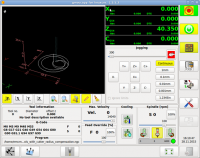objects not loaded or recognized
- mariusl
-
 Topic Author
Topic Author
- Offline
- Platinum Member
-

I have written a small Glade panel with six buttons on. I have a python srcript to handle the buttons but for some reason the halcomp and ini objects are not seen. I get no error when loading but when I want to write to the halpin.
how it is loaded in Gmoccapy
EMBED_TAB_NAME = gears
EMBED_TAB_LOCATION = box_vel_info
EMBED_TAB_COMMAND = gladevcp -u gearselect.py -x {XID} gear_select.glade
the python script
#!/usr/bin/env python
# -*- coding:UTF-8 -*-
"""
This file will control some options of the custom panel
and should be something like a skeleton to begin with
Please include a smal description of the file, so it is much
easier for other developers to follow yozr style. there ar many
lasy people out there, not taking care of that, please do not become
one of them!
Copyright 2013 Norbert Schechner
nieson@web.de
This program is free software; you can redistribute it and/or modify
it under the terms of the GNU General Public License as published by
the Free Software Foundation; either version 2 of the License, or
(at your option) any later version.
This program is distributed in the hope that it will be useful,
but WITHOUT ANY WARRANTY; without even the implied warranty of
MERCHANTABILITY or FITNESS FOR A PARTICULAR PURPOSE. See the
GNU General Public License for more details.
You should have received a copy of the GNU General Public License
along with this program; if not, write to the Free Software
Foundation, Inc., 59 Temple Place, Suite 330, Boston, MA 02111-1307 USA
"""
# Please read also the above text! And if you begin to code some new stuff
# please include comments, so others can follow you!
# Name varialbles so others do now there meaning, see the following example:
# v=f-s+(w.get_value)
# value = first_value - second_value + (widget.get_value)
# it cost no performanca, but is much easier to read!
# for coding style I recfommend to follow PEP8
# see : http://legacy.python.org/dev/peps/pep-0008/
####################################################################
# Watch the terminal output, as the error reports will apear there #
####################################################################
# We will need to import some basic stuff
import hal # needed to make our own hal pins
import hal_glib # needed to make our own hal pins and react with handlers
from gladevcp.persistence import IniFile # we use this one to save the states of the widgets on shut down and restart
from gladevcp.persistence import widget_defaults
from gladevcp.persistence import select_widgets
from gtk.gtkgl.widget import Widget
class GearSelect:
# __init__ will set the defaults and get all relevant information, before showing the panel
def __init__(self, halcomp, builder, useropts):
self.builder = builder
self.halcomp = halcomp
self.defaults = {
# the following names will be saved/restored as method attributes
# the save/restore mechanism is strongly typed - the variables type will be derived from the type of the
# initialization value. Currently supported types are: int, float, bool, string
IniFile.vars : { 'gear_state' : 0},
# to save/restore all widget's state which might remotely make sense, add this:
IniFile.widgets: widget_defaults(select_widgets(self.builder.get_objects(),
hal_only = True, output_only = True))
# a sensible alternative might be to retain only all HAL output widgets' state:
# IniFile.widgets: widget_defaults(select_widgets(self.builder.get_objects(), hal_only=True,output_only = True)),
}
self.ini_filename = 'gears'+'.var'
self.ini = IniFile(self.ini_filename, self.defaults, self.builder)
self.ini.restore_state(self)
# lets make our hal pins, to find out what pins you can build, please take a look at
# http://www.linuxcnc.org/docs/devel/html/hal/halmodule.html#_create_pins_and_parameters
# This way we are able to handle events here
# and this way we just can read or write the pin values, but not react to the changes
#self.halcomp.newpin("panel-is-hidden", hal.HAL_BIT, hal.HAL_OUT)
self.frame_main = self.builder.get_object("frame_main")
self.halcomp.newpin("selected-gear", hal.HAL_S32, hal.HAL_IO)
self.btn_1 = self.builder.get_object("btn-1")
self.btn_1.connect("clicked", self._btn_1_clicked)
self.btn_2 = self.builder.get_object("btn-2")
self.btn_2.connect("clicked", self._btn_2_clicked)
self.btn_3 = self.builder.get_object("btn-3")
self.btn_3.connect("clicked", self._btn_3_clicked)
self.btn_4 = self.builder.get_object("btn-4")
self.btn_4.connect("clicked", self._btn_4_clicked)
self.btn_5 = self.builder.get_object("btn-5")
self.btn_5.connect("clicked", self._btn_5_clicked)
self.btn_6 = self.builder.get_object("btn-6")
self.btn_6.connect("clicked", self._btn_6_clicked)
# if we want to have handlers to our widgets, or we want to modify them, we
# need to get there instance with the builder
# we get the needed widgets and connect them like so
#self.frame_main = self.builder.get_object("frame_main")
# self.lbl_text = self.builder.get_object("lbl_text")
# self.lbl_pin_value = self.builder.get_object("lbl_pin_value")
# Oh there is a button we will connect the pressed event to our own handler
# self.btn_set_text_to_label = self.builder.get_object("btn_set_text_to_label")
# self.btn_set_text_to_label.connect("pressed", self._btn_set_text_to_label_pressed)
# and this one to the clicked event
#self.btn_hide = self.builder.get_object("btn_hide")
#self.btn_hide.connect("clicked", self._btn_hide_clicked)
# OK here comes our handlers to react to the hal pin changes
# def _on_btn_select_rh_toggled(self, Widget):
def _btn_1_clicked(self, Widget):
self.gear_state = 1
self.ini.save_state(self)
self.halcomp["selected-gear"] = 1
def _btn_2_clicked(self, Widget):
self.gear_state = 2
self.halcomp["selected-gear"] = 2
def _btn_3_clicked(self, Widget):
self.gear_state = 3
self.halcomp["selected-gear"] = 3
def _btn_4_clicked(self, Widget):
self.gear_state = 4
self.halcomp["selected-gear"] = 4
def _btn_5_clicked(self, Widget):
self.gear_state = 5
self.halcomp["selected-gear"] = 5
def _btn_6_clicked(self, Widget):
self.gear_state = 6
self.halcomp["selected-gear"] = 6
def _on_destroy(self, obj, data = None):
self.ini.save_state(self)
def on_frame_main_destroy(self, object, data = None):
self.ini.save_state(self)
print("State saved on exit")
# This is the main procedure in this case, please take care that the name within the return value
# is exactly the same as the Class Name, (case senstitive)
def get_handlers(halcomp, builder, useropts):
return(GearSelect(halcomp, builder, useropts))the error
Traceback (most recent call last):
File "./gearselect.py", line 130, in _btn_1_clicked
self.ini.save_state(self)
AttributeError: GearSelect instance has no attribute 'ini'
Regards
Marius
www.bluearccnc.com
Please Log in or Create an account to join the conversation.
- ArcEye
- Offline
- Junior Member
-

- Posts: 25
- Thank you received: 758
You might have to wait for Chris, or someone who actually knows about glade and python
In the meanwhile, the only thing that occurs to me is this
self.ini_filename = 'gears'+'.var'
self.ini = IniFile(self.ini_filename, self.defaults, self.builder)You are passing a filename which assumes it is in the PWD, since there is no path.
Does that file exist and is it in the directory the python file is running from?
If not, is self.ini actually being created, or just a variable of that name?
regards
Please Log in or Create an account to join the conversation.
- mariusl
-
 Topic Author
Topic Author
- Offline
- Platinum Member
-

gladevcp: trouble looking for handlers in 'gearselect': iteration over non-sequence
Traceback (most recent call last):
File "/home/marius/dev/linuxcnc-dev/bin/gladevcp", line 129, in load_handlers
for object in objlist:
TypeError: iteration over non-sequence
Regards
Marius
www.bluearccnc.com
Please Log in or Create an account to join the conversation.
- ArcEye
- Offline
- Junior Member
-

- Posts: 25
- Thank you received: 758
EMBED_TAB_COMMAND = gladevcp -u gearselect.py -x {XID} gear_select.glade
The text above the handler states that the name must be exact.
# This is the main procedure in this case, please take care that the name within the return value
# is exactly the same as the Class Name, (case senstitive)
def get_handlers(halcomp, builder, useropts):
return(GearSelect(halcomp, builder, useropts))Please Log in or Create an account to join the conversation.
- mariusl
-
 Topic Author
Topic Author
- Offline
- Platinum Member
-

Ohh the comment refers to the very last statement in the file. This refers to the class return.
Regards
Marius
www.bluearccnc.com
Please Log in or Create an account to join the conversation.
- mariusl
-
 Topic Author
Topic Author
- Offline
- Platinum Member
-

You are passing a filename which assumes it is in the PWD, since there is no path.
Does that file exist and is it in the directory the python file is running from?
If not, is self.ini actually being created, or just a variable of that name?
Yes the ini file is created in the path of where the python script resides.
Regards
Marius
www.bluearccnc.com
Please Log in or Create an account to join the conversation.
- ArcEye
- Offline
- Junior Member
-

- Posts: 25
- Thank you received: 758
Well that has exhausted any knowledge I might have of parseltongue
Hope Chris or Norbert can help you
regards
Please Log in or Create an account to join the conversation.
- mariusl
-
 Topic Author
Topic Author
- Offline
- Platinum Member
-

Regards
Marius
www.bluearccnc.com
Please Log in or Create an account to join the conversation.
- newbynobi
-

- Offline
- Platinum Member
-

- Posts: 2083
- Thank you received: 415
I just took a very short look on it. I am pretty sure, that the self.defaults = ...
contains the error.
I do remember, when I wrote your plasma stuff I did fall in the same trap and needed long to get out.
May be tomorow I find some time to check it on detail.
Meanwhile, what happen if you do commend out all the ini stuff?
Norbert
Please Log in or Create an account to join the conversation.
- mariusl
-
 Topic Author
Topic Author
- Offline
- Platinum Member
-

Yes this thing is driving me crazy.
I have taken everything out the file. This is even another file and still get the error
gladevcp: trouble looking for handlers in 'tc': iteration over non-sequence
Traceback (most recent call last):
File "/home/marius/dev/linuxcnc-dev/bin/gladevcp", line 129, in load_handlers
for object in objlist:
TypeError: iteration over non-sequencePython script
# We will need to import some basic stuff
import hal # needed to make our own hal pins
import hal_glib # needed to make our own hal pins and react with handlers
#from gladevcp.persistence import IniFile # we use this one to save the states of the widgets on shut down and restart
from gladevcp.persistence import widget_defaults
from gladevcp.persistence import select_widgets
from gtk.gtkgl.widget import Widget
class TwinControl:
# __init__ will set the defaults and get all relevant information, before showing the panel
def __init__(self, halcomp, builder, useropts):
self.builder = builder
self.halcomp = halcomp
self.defaults = {
}
# self.ini_filename = 'control' + '.ini'
# self.ini = IniFile(self.ini_filename, self.defaults, self.builder)
# self.ini.restore_state(self)
# lets make our hal pins, to find out what pins you can build, please take a look at
# http://www.linuxcnc.org/docs/devel/html/hal/halmodule.html#_create_pins_and_parameters
# This way we are able to handle events here
# This is the main procedure in this case, please take care that the name within the return value
# is exactly the same as the Class Name, (case senstitive)
def get_handlers(halcomp, builder, useropts):
return(TwinControl(halcomp, builder, useropts))Regards
Marius
www.bluearccnc.com
Please Log in or Create an account to join the conversation.
